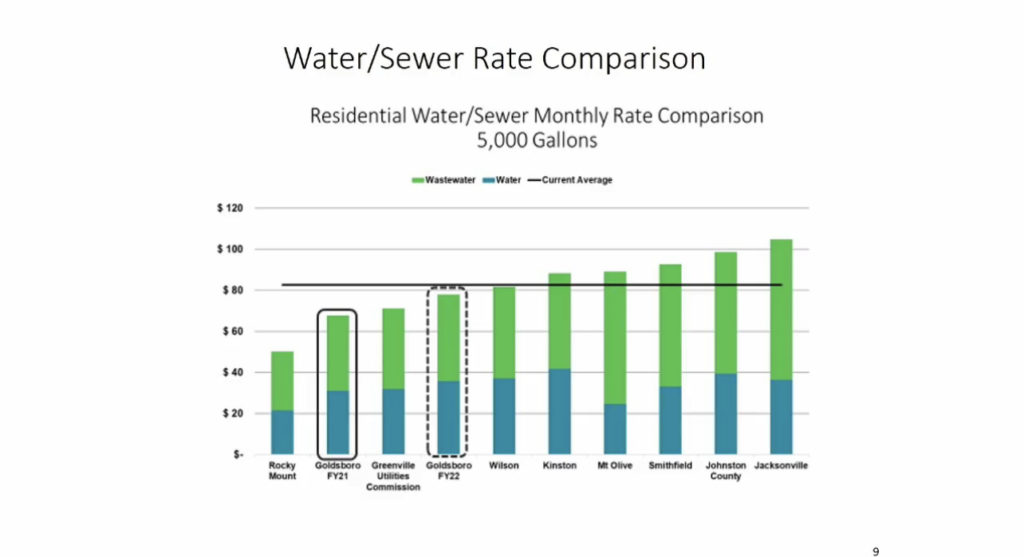
Critical moments require tough — but prudent — decisions. City water rate hike is one of them.
It is a decision, but it is not a good one.
So we are going to try one more time to tell members of the Goldsboro City Council why there is only one right choice when it comes to the city’s Utility Fund woes — and that it is critical that city leaders man (and woman) up and do what needs to be done.
Some council members were uneasy about hitting residents with another water rate hike and so, as a result of the stalemate, the board directed City Manager Tim Salmon to fund immediate infrastructure needs with American Rescue Plan dollars.
It would be nice if that were the solution and if the city’s Utility Fund problems could be wrapped up in a nice neat bow, but it isn’t — and not just because of the transient nature of this federal dollar dump.
It is because that move addresses the symptoms, not the cause.
Without a water rate hike, Goldsboro’s Utility Fund will be bankrupt by 2023.
We know, that’s not what any of us want to hear. Not too many of us have extra dollars to throw around these days.
But we have to face facts. We have to make the tough decision — not just for us, but for our children and grandchildren. We have to think ahead and bigger than this moment.
And our leaders have to be the voice of reason in an untenable situation.
This is not about keeping a council seat or political power. This is about what is best for Goldsboro.
This is one of those moments when it counts, when it is hard.
But forget, for a moment, the implications of a zero- or negative-balance Utility Fund.
Try to set aside that the Local Government Commission will levy severe consequences on the city, that Goldsboro will lose its bond rating and a moratorium will be placed on development — from housing to industry.
Perhaps more frightening than those pending realities is the message it sends to Raleigh.
According to people in the room when it happened, State Rep. John Bell warned members of the council that “generational” money would soon be available to local municipalities — that Goldsboro could receive game-changing funds if it plays its cards right.
But inaction, he noted, would result in the city being passed over for comparable communities that have shown a willingness to make the tough decisions when it mattered most.
Goldsboro currently has substantially lower rates than Wilson, Kinston, Mt. Olive, Smithfield, Johnston County and Jacksonville.

So, at the moment, it seems fair to assume those communities, then, would be prioritized when the windfall comes.
Why?
Because they have shown a commitment to doing what is necessary to keep their governments operating efficiently.
It’s true that even with a 15-percent water rate hike, Goldsboro residents would still be paying less than the aforementioned communities.
But if the council bites the bullet and takes the tough — but prudent — action, the city would still be in the game, so to speak.
We put them in office to make these big decisions, to respond to the call.
And we get it, this is a big ask.
We understand that Councilman Taj Polack, Councilwoman Hiawatha Jones and Councilwoman Brandi Matthews — the three council members who are holding out on a yes vote — feel like they are being asked to take a public relations hit for the actions of previous board members.
Sure, they weren’t there when the decision to avoid rate and tax hikes would have been a decision that would have set the city on the right path for future growth. We get that those who voted to keep tax rates low had the easy “yes.”
But there will be consequences for another “easy” vote, the one that stops the phone calls and emails.
And there will absolutely be a moment of reckoning.
There always is.
Water rates will have to go up — if not now, then within 12 months.
And Salmon was clear that if the water rate hike fails this year, the next ask will be far heftier.
A utility fund cannot be insolvent.
A bond rating cannot be destroyed.
Development cannot stop dead in its tracks.
And water and sewer concerns are not going anywhere.
Without an increase, the cuts will be draconian — and that means job loss.
There will not be enough little line-item cuts to save this one. No way.
So, get mad at Thursday’s meeting. Tell the public — and your fellow board members — that you feel you are being forced into a rate increase that makes you look bad.
And be honest with the public about the fact that even with this 15 percent increase, they are still paying lower water bills than the majority of their neighbors within a 100-mile radius.
If you have to choose one, compromise by voting against the property tax increase and for the water rate hike.
It is that much more important.
The measure of a leader is how he or she does the hard stuff — and this falls into that category.
Show us — and the community — that you get that.
We can figure out as a community where to point the fingers later.

A loaded discussion

Fighting for their lives

Goldsboro loses a giant

“I’m a flippin’ hurricane!”
Public Notices — Feb. 8, 2026

Belting it out

Legendary

Final Four!


